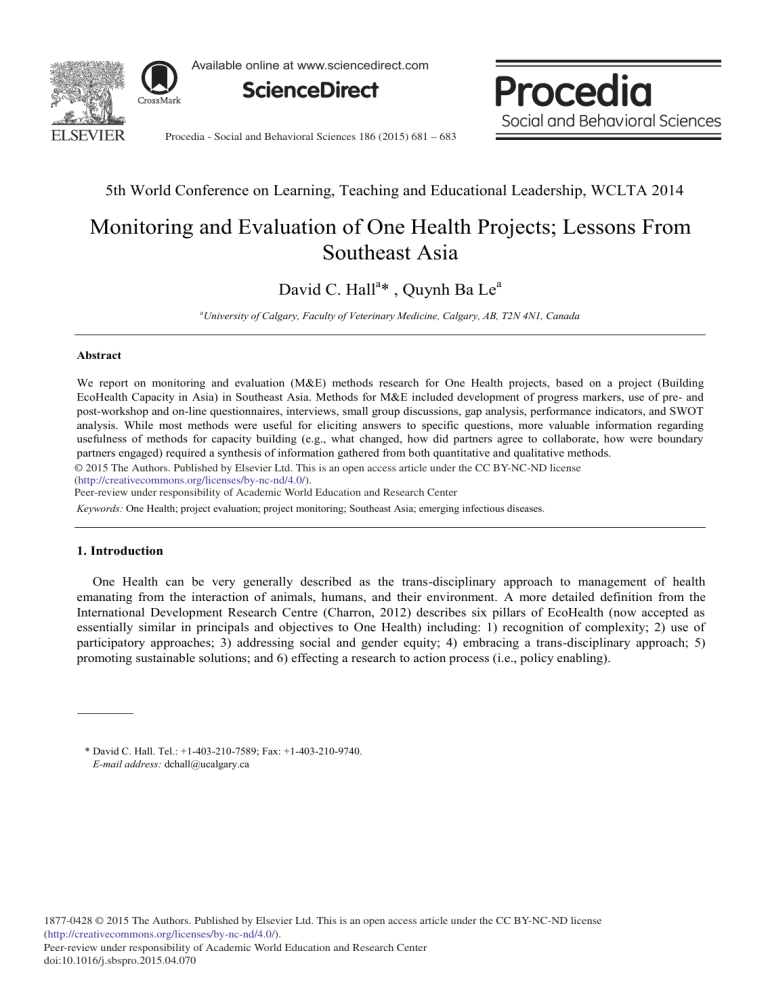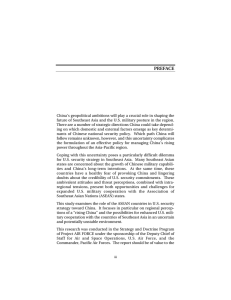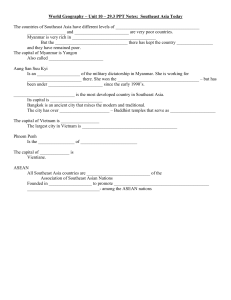M&E one health
advertisement

Available online at www.sciencedirect.com ScienceDirect Procedia - Social and Behavioral Sciences 186 (2015) 681 – 683 5th World Conference on Learning, Teaching and Educational Leadership, WCLTA 2014 Monitoring and Evaluation of One Health Projects; Lessons From Southeast Asia David C. Halla* , Quynh Ba Lea a University of Calgary, Faculty of Veterinary Medicine, Calgary, AB, T2N 4N1, Canada Abstract We report on monitoring and evaluation (M&E) methods research for One Health projects, based on a project (Building EcoHealth Capacity in Asia) in Southeast Asia. Methods for M&E included development of progress markers, use of pre- and post-workshop and on-line questionnaires, interviews, small group discussions, gap analysis, performance indicators, and SWOT analysis. While most methods were useful for eliciting answers to specific questions, more valuable information regarding usefulness of methods for capacity building (e.g., what changed, how did partners agree to collaborate, how were boundary partners engaged) required a synthesis of information gathered from both quantitative and qualitative methods. ©2015 2015The TheAuthors. Authors. Published Elsevier © Published by by Elsevier Ltd.Ltd. This is an open access article under the CC BY-NC-ND license (http://creativecommons.org/licenses/by-nc-nd/4.0/). Peer-review under responsibility of Academic World Education and Research Center. Peer-review under responsibility of Academic World Education and Research Center Keywords: One Health; project evaluation; project monitoring; Southeast Asia; emerging infectious diseases. 1. Introduction One Health can be very generally described as the trans-disciplinary approach to management of health emanating from the interaction of animals, humans, and their environment. A more detailed definition from the International Development Research Centre (Charron, 2012) describes six pillars of EcoHealth (now accepted as essentially similar in principals and objectives to One Health) including: 1) recognition of complexity; 2) use of participatory approaches; 3) addressing social and gender equity; 4) embracing a trans-disciplinary approach; 5) promoting sustainable solutions; and 6) effecting a research to action process (i.e., policy enabling). * David C. Hall. Tel.: +1-403-210-7589; Fax: +1-403-210-9740. E-mail address: dchall@ucalgary.ca 1877-0428 © 2015 The Authors. Published by Elsevier Ltd. This is an open access article under the CC BY-NC-ND license (http://creativecommons.org/licenses/by-nc-nd/4.0/). Peer-review under responsibility of Academic World Education and Research Center doi:10.1016/j.sbspro.2015.04.070 682 David C. Hall and Quynh Ba Le / Procedia - Social and Behavioral Sciences 186 (2015) 681 – 683 The principles of One Health have been well outlined in textbooks (Mackenzie, et al., 2013), case study reports (Hall and Coghlan, 2011), and courses (Barrett, et al., 2011). However, as far as we are aware, methods and their success for monitoring and evaluating One Health projects have not been documented in the literature. Such knowledge is important due to the trans-disciplinary nature of a One Health approach, suggesting traditional methods of monitoring and evaluation may not be as effective or appropriate as newer methods. 2. Methods A One Health project (Building EcoHealth Capacity in Asia or BECA) was begun in January 2010 and ran for three and a half years in six countries in Southeast Asia (Cambodia, China, Indonesia, Lao PDR, Thailand, and Vietnam). The research project investigated the processes involved in building the capacity for research and application of ecosystem approaches to health management among researchers, development practitioners, and policy makers in Southeast Asia. The research also investigated the methodologies and tools which contribute to effective capacity building in ecosystem approaches. The BECA project brought actors together from different countries and institutions to a series of more than eight meetings and workshops located in various main cities in Southeast Asia. Totaling more than 100 participants, these individuals had an array of experience and expertise in the prevention of emerging infectious diseases (EIDs), public health, and health promotion. A non-exhaustive list of activities included basic to advanced information sessions on One Health, workshops on identification of researchable issues and funding applications, writing and targeting of policy briefs, and methods for engagement of community members. The research and training was expected to contribute in the longer term to an effective network of expertise in ecosystem approaches to managing health, contributing to One Health skills and knowledge development in the region including input to One Health policy formulation. The target audience of this project included academic researchers, government staff, and extension personnel who were and will continue to be involved in promoting integration and application of One Health approaches. An important part of the project was monitoring and evaluation (M&E), including end-of-project findings and identifying a process for Monitoring and Evaluation (M&E) of Ecohealth/One Health projects. Methods examined and applied to varying degree for M&E included presentation at meetings, online blog sessions, online sharing of project documents, development of progress markers, use of pre- and post-workshop (as well as on-line) questionnaires, one-on-one and small group interviews, small group discussions, gap analysis, identification of performance indicators, and SWOT analysis. We also held a two day session on Outcome Mapping (Earl, Carden, and Smutylo, 2001) and applied selected elements of the method identified by the participants. An advanced application of questionnaire, telephone interview, and one-on-one sessions was trialed with Vietnamese participants. Analysis and write-up of the latter method is complete; reporting is pending final acceptance in the evaluation literature. 3. Results and Discussion As a method for engaging researchers in thinking about, applying, and communicating findings from One Health activities, the standard approach of presentations at international conferences (oral and poster) worked very well where participants were knowledgeable in some aspect of health management. This method builds capacity in One Health while developing and identifying leadership and was used effectively in the project to address capacity in regional development of public health policy (e.g., see Hall, et al., 2013). Other less formal forms of communication among participants (project website including downloadable documents and an ongoing blog and discussion groups) were more challenging not just to maintain but also to promote and use as a tool for engaging participants. Part of the reason identified by participants was insufficient time to engage, lack of results to share, or worry that information offered would not be well received. A more successful method of communication for the project was to link with other institutional centres (e.g., universities) in the region by direct communication (e.g., email) with institutional leaders and partners, presentations at academic and community events, and following events on websites where available. However, this was also costly in terms of funds and time. We did not identify a single methodology that we felt was highly effective at maintaining David C. Hall and Quynh Ba Le / Procedia - Social and Behavioral Sciences 186 (2015) 681 – 683 683 communication between participants and projects; a combination of the above methods with essential availability of project information on the web seems to have had most benefit. Of the various evaluation methods (including direct questions in one-on-one interviews, indirect questions on questionnaires, exercises including GAP and SWOT analysis, and Performance Indicator analysis), nothing worked better to learn of BECA contributions to other initiatives than informal conversation. For example, coffee breaks and lunches at workshops, casual networking at meetings and conferences, and third hand information from communication with colleagues proved highly useful to learning of participant activities in other initiatives in the region, and to gather feedback as to application of how and where BECA lessons were being applied. Two reasons for this based on one-on-one interviews with project leaders at the final workshop of the project seemed to be 1) participants were more reluctant to share information during a formal evaluation process in case project leaders viewed their comments in a negative light, and 2) participants felt that identifying participation in numerous projects might somehow jeopardize future participation due to “over participation” of that one individual. To some extent, the latter is a legitimate concern for One Health training in the region. With regard to the first reason, efforts to make documentation less intimidating during final evaluation (e.g., video recording of an interview can be intimidating for participants whereas jotting down occasional notes during a semi-structured interview) was recommended by a few participants. 4. Conclusions General strengths of several of the M&E methods identified included clarity of instructions for participants, use of participatory approaches, ease of interpreting results, and little need for advanced quantitative methods. Limitations of the M&E approach included selection processes for identifying participants, lack of detail in questionnaire answers, respondent bias, and time needed to conduct interviews. The M&E process could have been improved by setting clearer indicators relating to specific outputs, documenting their status over the course of the project, and by increased communication among participants during the project. Acknowledgements We are grateful for funding for the BECA project from the International Development Research Centre and the Australian Government (AusAID). The project was implemented as a field activity of Veterinarians without Borders/ Vétérinaires sans Frontières - Canada. References Barrett, M.A., Bouley, T.A., Stoertz, A.H., and Stoertz, R.W. (2011). Integrating a One Health approach in education to address global health and sustainability challenges. Frontiers in Ecology and the Environment. 9: 239–245. http://dx.doi.org/10.1890/090159 Charron, D. (ed.) (2012). Ecohealth Research in Practice: Innovative Applications of an Ecosystem Approach to Health. Insight and Innovation in International Development 1, DOI 10.1007/978-1-4614-0517-7_1. International Development Research Centre, Ottawa. Earl, S., Carden, F., and Smutylo, T. (2001). Outcome Mapping. International Development Research Centre. Ottawa. Hall, D.C. and Coghlan, B. (2011). Implementation of the One Health approach in Asia & Europe: How To Set Up A Common Basis For Action and Exchange Of Experience. EEAS of the European Union. Brussels. Hall, D.C., Nguyen-Viet, H., Willyanto, I., Tung, D.X. and Chotinun, S. (2013). Improving food safety in Asia through increased capacity in ecohealth. Journal of Public Health and Epidemiology. DOI: 10.5897/JPHE12.009 Mackenzie, J.S., Jeggo, M., Daszak, P., and Richt, J.A. (eds.) (2013). One Health: The Human-Animal-Environment Interfaces in Emerging Infectious Diseases: Food Safety and Security, and International and National Plans for Implementation of One Health Activities. Springer.


